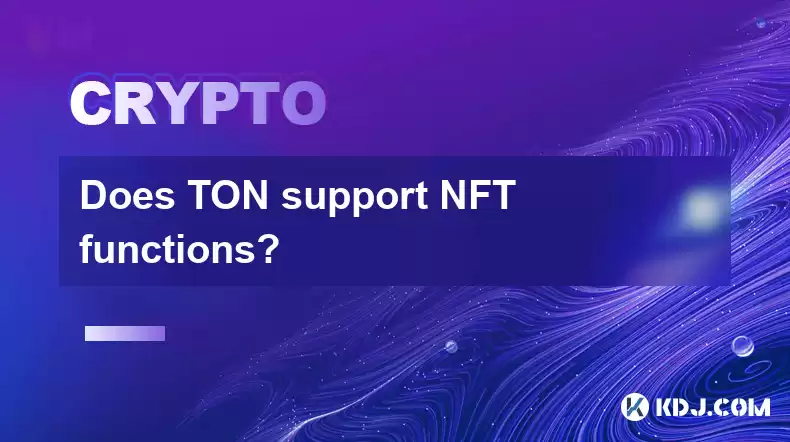-
 Bitcoin
Bitcoin $116400
-0.36% -
 Ethereum
Ethereum $4033
3.40% -
 XRP
XRP $3.302
-1.26% -
 Tether USDt
Tether USDt $1.000
-0.02% -
 BNB
BNB $796.1
1.67% -
 Solana
Solana $177.8
1.89% -
 USDC
USDC $0.9999
0.00% -
 Dogecoin
Dogecoin $0.2314
4.09% -
 TRON
TRON $0.3381
0.14% -
 Cardano
Cardano $0.7989
1.22% -
 Stellar
Stellar $0.4496
-1.84% -
 Chainlink
Chainlink $20.42
9.42% -
 Hyperliquid
Hyperliquid $41.17
0.88% -
 Sui
Sui $3.914
3.77% -
 Bitcoin Cash
Bitcoin Cash $584.7
1.52% -
 Hedera
Hedera $0.2632
-0.54% -
 Avalanche
Avalanche $24.09
3.40% -
 Ethena USDe
Ethena USDe $1.001
-0.02% -
 Litecoin
Litecoin $123.2
1.33% -
 Toncoin
Toncoin $3.318
-0.04% -
 UNUS SED LEO
UNUS SED LEO $8.984
-0.05% -
 Shiba Inu
Shiba Inu $0.00001323
2.85% -
 Uniswap
Uniswap $10.90
4.41% -
 Polkadot
Polkadot $3.999
3.34% -
 Dai
Dai $1.000
0.01% -
 Cronos
Cronos $0.1630
9.64% -
 Bitget Token
Bitget Token $4.484
0.82% -
 Monero
Monero $272.4
2.44% -
 Pepe
Pepe $0.00001173
6.03% -
 Aave
Aave $290.8
2.88%
Does TON support NFT functions?
TON blockchain supports NFTs via its smart contracts, offering potentially lower fees and higher scalability than Ethereum, though its ecosystem is still developing.
Mar 08, 2025 at 01:43 pm

Key Points:
The TON blockchain does support NFT functionality, though its implementation differs from some other platforms.
TON's approach leverages its smart contracts and unique features for NFT creation and management.
Several projects are already utilizing TON for NFT deployment, demonstrating its capabilities.
While TON might not have the same brand recognition as Ethereum for NFTs, its technical advantages offer potential benefits.
Understanding TON's architecture and tools is crucial for effectively utilizing its NFT capabilities.
Does TON Support NFT Functions?
The answer is a resounding yes. The Telegram Open Network (TON) blockchain does indeed support non-fungible token (NFT) functionality. However, it's important to understand how TON achieves this, as its implementation differs slightly from more established NFT platforms like Ethereum. Unlike Ethereum's reliance on ERC-721 standards, TON utilizes its own smart contract capabilities to create and manage NFTs. This means that while the core functionality remains the same – unique digital assets representing ownership – the technical specifics are distinct.
How are NFTs created on TON?
NFT creation on TON involves deploying smart contracts specifically designed for managing NFT metadata and ownership. These contracts define the attributes of the NFT, such as its image, description, and any other relevant data. The process typically involves using TON's development tools and programming languages, like Solidity, to create these contracts and then deploying them to the TON blockchain. This deployment process secures the NFT's existence on the decentralized ledger.
Write a smart contract defining the NFT's properties.
Compile the contract using appropriate tools.
Deploy the contract to the TON blockchain.
Mint the NFT using the deployed contract.
What are the advantages of using TON for NFTs?
TON offers several potential advantages for NFT creation and deployment. Its high transaction throughput and low fees can make it a more cost-effective option compared to some other blockchains, especially for large-scale NFT projects or frequent transactions. Furthermore, TON's architecture is designed for scalability, potentially mitigating issues of congestion and high gas fees that can plague other networks during peak times. The ease of use of its tools also contributes to faster development cycles.
What are the limitations of using TON for NFTs?
While TON offers compelling advantages, it's also important to acknowledge potential limitations. Compared to Ethereum, TON has a smaller and less established NFT ecosystem. This means fewer tools, less community support, and potentially lower liquidity for traded NFTs. The relative novelty of TON's NFT implementation also means that there's a smaller body of established best practices and readily available resources for developers.
What tools are available for creating NFTs on TON?
Several tools and resources are emerging to assist developers in creating and managing NFTs on TON. These range from integrated development environments (IDEs) to libraries and frameworks that simplify the process of writing and deploying smart contracts. The TON community is actively developing and improving these tools, making NFT creation on TON increasingly accessible. While the ecosystem is still growing, it's steadily maturing, providing a more user-friendly experience.
How does TON handle NFT metadata?
The metadata associated with a TON NFT is crucial for displaying its attributes. This metadata is typically stored off-chain, meaning it's not directly part of the blockchain's data. However, the smart contract on TON holds a pointer or reference to this off-chain metadata. This approach is common in many blockchain-based NFT systems and allows for larger and more complex metadata to be associated with each NFT without bloating the blockchain itself. Careful consideration of metadata storage and accessibility is essential for a positive user experience.
What are some examples of NFT projects on TON?
While still relatively new, several NFT projects are already showcasing TON's capabilities. These projects range from digital art collections to unique in-game assets and collectibles. These early adopters are actively contributing to the growth of the TON NFT ecosystem and demonstrating its potential for diverse applications. Exploring these projects can offer valuable insights into the practical use of TON for NFTs.
How does TON's scalability impact NFT projects?
TON's scalability is a key differentiator. Unlike some blockchains that struggle with high transaction volumes, TON is designed to handle a large number of transactions efficiently. This scalability is particularly beneficial for NFT projects that involve numerous mints, trades, or interactions. This inherent scalability can potentially lead to a more seamless and cost-effective user experience for NFT creators and collectors alike.
Is it easy to transfer TON NFTs?
Transferring TON NFTs is relatively straightforward, provided you have the necessary tools and understanding of the TON blockchain's mechanics. The process generally involves interacting with the smart contract associated with the NFT using a compatible wallet or interface. Similar to transferring tokens on other blockchains, it requires a transaction fee and confirmation on the network. The simplicity of this process is a crucial aspect of a successful NFT ecosystem.
Are there any security concerns with TON NFTs?
As with any blockchain-based technology, security is paramount. It's essential to use reputable wallets and adhere to best practices for securing private keys. Understanding the intricacies of smart contracts and ensuring their proper functionality is crucial to mitigating risks. While TON itself benefits from robust security features, individual user practices significantly influence the overall security of their NFT holdings.
Common Questions and Answers:
Q: What is the difference between TON NFTs and NFTs on other blockchains like Ethereum? A: The primary difference lies in the technical implementation. Ethereum uses ERC-721 standards, while TON utilizes its native smart contract capabilities. This results in different development processes and potentially different levels of interoperability.
Q: Are TON NFTs interoperable with NFTs on other blockchains? A: Currently, interoperability between TON NFTs and NFTs on other blockchains is limited. However, future developments might introduce bridges or protocols to facilitate cross-chain NFT transfers.
Q: What are the gas fees for creating and transferring TON NFTs? A: TON’s gas fees are generally lower than Ethereum’s, making it a more cost-effective option for high-volume NFT transactions. The exact fees depend on network congestion.
Q: What wallets support TON NFTs? A: Several wallets are compatible with TON, offering support for managing and interacting with TON-based NFTs. Check the official TON documentation for an updated list of compatible wallets.
Q: How secure is the TON blockchain for NFTs? A: TON employs robust security measures, but individual user practices and the security of the smart contracts themselves play a significant role in the overall security of the NFTs. Always exercise caution and follow security best practices.
Disclaimer:info@kdj.com
The information provided is not trading advice. kdj.com does not assume any responsibility for any investments made based on the information provided in this article. Cryptocurrencies are highly volatile and it is highly recommended that you invest with caution after thorough research!
If you believe that the content used on this website infringes your copyright, please contact us immediately (info@kdj.com) and we will delete it promptly.
- Decentralized Data: Taking the Driver's Seat in the Data Economy
- 2025-08-09 14:30:11
- Bitcoin vs. Gold: The Store-of-Value Showdown in the Digital Age
- 2025-08-09 14:30:11
- BlockDAG, Stellar, and Crypto Adoption: Navigating the Hype
- 2025-08-09 14:50:12
- Litecoin Price Surge: Riding the Wave of Institutional Interest and ETF Hopes
- 2025-08-09 14:50:12
- Chainlink's Wild Ride: Whales Are Still Loading Up on LINK!
- 2025-08-09 15:10:11
- Ruvi AI: Solana's New Challenger Dominating Token Sales with AI Innovation
- 2025-08-09 14:55:15
Related knowledge

Where can I buy UMA (UMA)?
Aug 07,2025 at 06:42pm
Understanding UMA and Its Role in Decentralized FinanceUMA (Universal Market Access) is an Ethereum-based decentralized finance (DeFi) protocol design...

How to buy Storj (STORJ) tokens?
Aug 09,2025 at 07:28am
Understanding Storj (STORJ) and Its Role in Decentralized StorageStorj is a decentralized cloud storage platform that leverages blockchain technology ...

What is the best app to buy Nano (NANO)?
Aug 09,2025 at 03:35am
Understanding Nano (NANO) and Its Unique FeaturesNano is a feeless, instant cryptocurrency designed for fast peer-to-peer transactions. Unlike many ot...

Where can I purchase Siacoin (SC)?
Aug 08,2025 at 11:14am
Understanding Siacoin (SC) and Its Role in the Sia NetworkSiacoin (SC) is the native cryptocurrency of the Sia decentralized cloud storage platform, a...

Where can I buy OMG Network (OMG)?
Aug 08,2025 at 12:57pm
Understanding OMG Network (OMG) and Its PurposeThe OMG Network, originally known as OmiseGO, is a layer-2 scaling solution built on the Ethereum block...

What exchanges support buying IOTA (MIOTA)?
Aug 07,2025 at 09:58pm
Understanding the Role of Private Keys in Cryptocurrency SecurityIn the world of cryptocurrency, private keys are the cornerstone of ownership and con...

Where can I buy UMA (UMA)?
Aug 07,2025 at 06:42pm
Understanding UMA and Its Role in Decentralized FinanceUMA (Universal Market Access) is an Ethereum-based decentralized finance (DeFi) protocol design...

How to buy Storj (STORJ) tokens?
Aug 09,2025 at 07:28am
Understanding Storj (STORJ) and Its Role in Decentralized StorageStorj is a decentralized cloud storage platform that leverages blockchain technology ...

What is the best app to buy Nano (NANO)?
Aug 09,2025 at 03:35am
Understanding Nano (NANO) and Its Unique FeaturesNano is a feeless, instant cryptocurrency designed for fast peer-to-peer transactions. Unlike many ot...

Where can I purchase Siacoin (SC)?
Aug 08,2025 at 11:14am
Understanding Siacoin (SC) and Its Role in the Sia NetworkSiacoin (SC) is the native cryptocurrency of the Sia decentralized cloud storage platform, a...

Where can I buy OMG Network (OMG)?
Aug 08,2025 at 12:57pm
Understanding OMG Network (OMG) and Its PurposeThe OMG Network, originally known as OmiseGO, is a layer-2 scaling solution built on the Ethereum block...

What exchanges support buying IOTA (MIOTA)?
Aug 07,2025 at 09:58pm
Understanding the Role of Private Keys in Cryptocurrency SecurityIn the world of cryptocurrency, private keys are the cornerstone of ownership and con...
See all articles

























































































